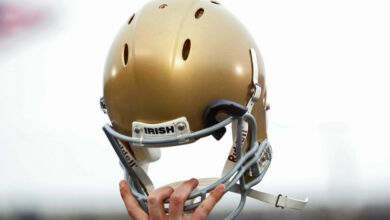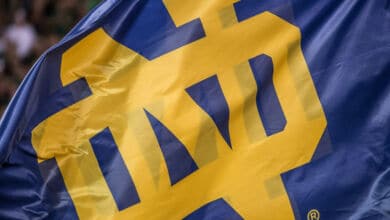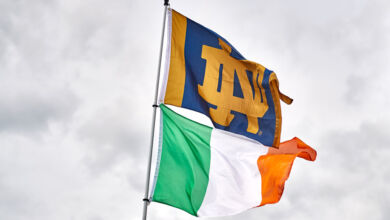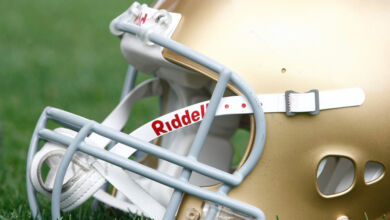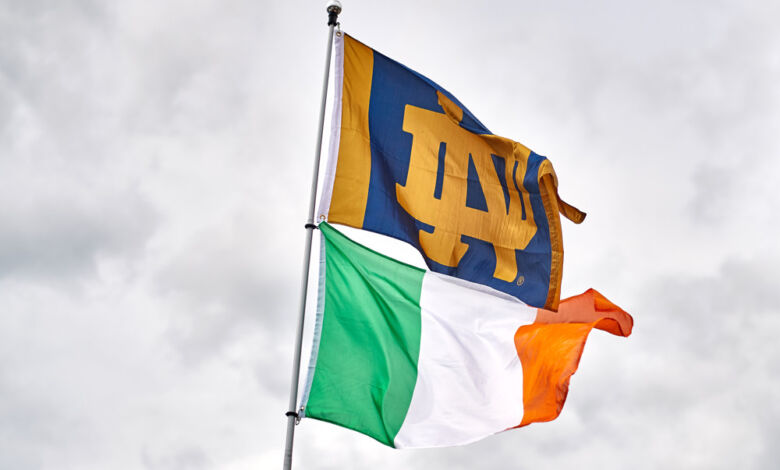
It’s been more than three decades since the Notre Dame Fighting Irish last won a national title. Getting that last championship run in 1988 started was something requiring Irish fans to ride a roller coaster of emotions. Then, putting their trust in a small walk-on to come through in the clutch was next on the agenda.
Notre Dame’s 19-17 season-opening victory over longtime, bitter rival Michigan on Sept. 10, 1988, was played under the lights at home. It marked the second consecutive year that the Irish had defeated the Wolverines. The previous year’s 26-7 win was largely the byproduct of Notre Dame exploiting seven Michigan turnovers.
The Coaches: Holtz in Critical Year Three
Lou Holtz was beginning his third season as head coach of the Irish, with all three campaigns getting started with a matchup against the Wolverines. The first of those meetings was his debut and ended in a 24-23 heartbreaking loss. By the end of the following year, Holtz led his team to a Cotton Bowl berth, with an eye toward much bigger things in 1988.
Bo Schembechler was set to begin his 20th season of running the Michigan football program. During that lengthy span, his team experienced plenty of highs but had come up agonizingly short of a national championship on multiple occasions. Entering the 1988 season, the Wolverines were ranked 11th, compared to the 13th-ranked Fighting Irish.
The Key Players
Tony Rice was behind center for his second season with Notre Dame and while he threw for nearly 1,200 yards in 1988, his legs would be more valuable. Rice led the team in rushing that season with 700 yards and combined with Mark Green and Reggie Brooks to gain more than 2,000 yards on the ground. Receiving options like Ricky Watters and Rocket Ismail were also available, while the team’s defense would hold opponents to an average of just 11 points per game.
At quarterback for Michigan was Michael Taylor, who still largely ran a run-friendly attack. Taylor split time behind center with Demetrius Brown, though only one Wolverines wideout ended up having 20 more receptions on the year. Instead, the rushing tandem of Tony Boles and Leroy Hoard gained close to 2,000 yards and scored a combined 18 touchdowns. On defense, Michigan ended up holding six opponents to single-digits in 1988 and finished in the top 10 for the fewest points allowed.
The Game
Notre Dame received the opening kickoff before their drive stalled, with Michigan not even managing a first down on its first series. That led to a Wolverines punt, which was caught at the Irish 19 by Watters, who ran it back 81 yards to strike the first blow of the game and give Notre Dame a 7-0 advantage.
Michigan continued to struggle during the opening period, allowing the Irish to forge an eight-play drive covering 43 yards. Two runs totaling 35 yards from Rice and Brooks were keys to setting up the first of four field goals by that walk-on kicker, Reggie Ho. The diminutive Ho stood just five-feet-five, but the native Hawaiian’s leg boosted the Irish lead to 10-0
Disaster then struck the Wolverines on the ensuing kickoff when Hoard fumbled the ball away. Michigan’s defense helped limit the damage by stopping Notre Dame on a three-and-out. That led to a 38-yard field goal from Ho and a 13-0 Irish lead.
At that point, the Wolverines woke up and started to move the chains, getting a huge boost when Boles broke off a 59-yard return to put it at the Irish 38. The 12-play drive that followed lasted more than six minutes and ended when Hoard got into the end zone to allow Michigan to slice the deficit to six.
Defense on both sides stopped any scoring for the remainder of the half and kept up that pace until midway through the third quarter. This time, it was a Notre Dame miscue that led to a score when Watters fumbled on the Irish 14. Then, on a third-and-seven at the 11, Irish defensive back Corny Southall was flagged for interference in the end zone. That automatic first down was then converted into the go-ahead score on a Taylor one-yard run on fourth-and-goal.
Notre Dame responded with a 12-play, 68-yard drive that ended with a 26-yard three-pointer from Ho in the first minute of the final quarter. A 23-yard catch by Steve Alaniz and a 16-yard run for a first down by Mark Green were integral to giving the Irish a temporary lead at 16-14.
The Wolverines answered back in slow motion by eating more than eight minutes off the clock on a 16-play drive that concluded when Mike Gillette booted a 49-yard field goal with 5:38 left to make it 17-16 in favor of Michigan.
On the first play of what turned out to be the winning drive, the Wolverines were penalized for pass interference. On the next play, Rice picked 21 yards on a run to put the ball at the Michigan 44, with Rice and Brooks then hooking up on an 18-yard reception. When the 10-play drive ended, Ho put the Irish ahead for good with another 26-yard field to make it 19-17 with 1:13 left.
That was nearly enough time for Michigan to pull off a dramatic last-second win. Instead, Gillette’s 48-yard field goal attempt was off to the right to give Notre Dame the win. The defeat for the Wolverines marked only the third time in Schembechler’s career at the school that his team had opened the season with a loss.
The Aftermath
Using that thrilling victory as a springboard, Holtz and the Irish would run through the regular season with an undefeated record. Their only other win of less than 10 points came one month later in the heated Catholics vs. Convicts matchup against the Miami Hurricanes. Then, a 34-21 win over West Virginia in the Fiesta Bowl delivered the first national title for the Irish in 11 years.
Just one week after the heartbreaking loss to Notre Dame, Michigan had to endure more pain when they lost to Miami by a single point in the school’s home opener. That effectively ended their quest for a national championship, though they did go undefeated from there and finished the season ranked fourth.
Ho’s heroics didn’t translate into an NFL career, but he ended up doing well for himself, earning a medical degree and becoming a cardiologist. Irish fans have had plenty of heartstopping moments over the years, with Ho being someone in a position to revive them if needed.
